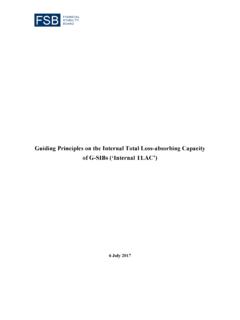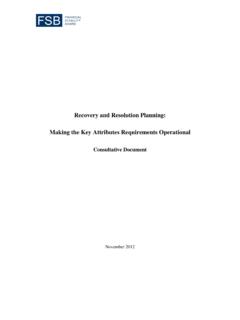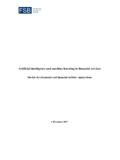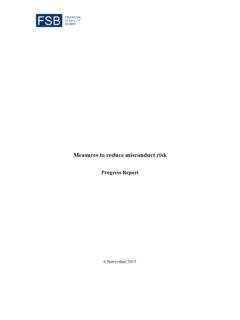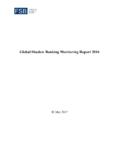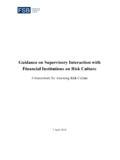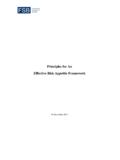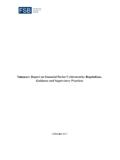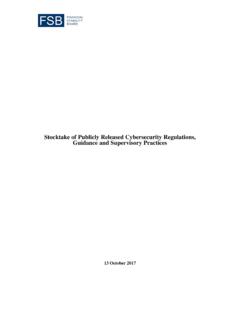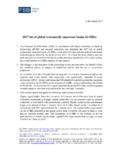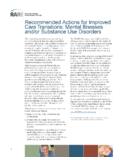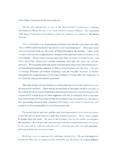Transcription of Reforming Major Interest Rate Benchmarks
1 Reforming Major Interest Rate Benchmarks 22 July 2014 i Content Page I. Executive Summary .. 1 II. Introduction .. 3 III. The Role of Reference Interest rates .. 6 A. Different uses of reference Interest rates .. 6 1. Credit products .. 7 2. Derivatives .. 8 3. The use of reference Interest rates in other products .. 9 B. Market demand for different types of rates .. 10 C. Fit for purpose (official sector s viewpoint) .. 11 IV. Framework for Change .. 11 A. Guiding principles .. 11 1. IOSCO s principles for financial Benchmarks .. 12 2. Additional principles for change .. 12 B. Implications .. 13 V. Currency 16 A. Summary .. 16 B. Individual currency reports .. 21 1. Euro currency report .. 21 2. Sterling currency report .. 28 3. Swiss franc currency report .. 32 4. dollar currency report .. 38 5. Yen currency report.
2 45 6. Global transition issues .. 51 VI. Contingency Arrangements .. 56 VII. Review of Existing Benchmarks .. 57 A. Findings of reviews .. 57 B. Recommendations .. 58 VIII. Recommendations and Next Steps .. 58 A. Summary list of specific recommendations for currency subgroups .. 59 1. IBOR + recommendations .. 59 ii 2. RFR recommendations .. 59 B. The future of the OSSG .. 60 1. OSSG renewed mandate .. 60 Abbreviations .. 61 Annex 1 OSSG participants .. 64 1 Reforming Major Interest Rate Benchmarks I. Executive Summary The Major Interest reference rates (such as LIBOR, EURIBOR, and TIBOR) are widely used in the global financial system as Benchmarks for a large volume and broad range of financial products and contracts. The cases of attempted market manipulation and false reporting of global reference rates , together with the post-crisis decline in liquidity in interbank unsecured funding markets, have undermined confidence in the reliability and robustness of existing interbank benchmark Interest rates .
3 Uncertainty surrounding the integrity of these reference rates represents a potentially serious source of vulnerability and systemic risk. Against this background, the G20 asked the FSB to undertake a fundamental review of Major Interest rate Benchmarks and plans for reform to ensure that those plans are consistent and coordinated, and that Interest rate Benchmarks are robust and appropriately used by market participants. To take the work forward, the FSB established a high-level Official Sector Steering Group (OSSG) of regulators and central banks. The OSSG was assigned responsibility for coordinating and maintaining the consistency of reviews of existing Interest rate Benchmarks and for guiding the work of a Market Participants Group, which was in turn tasked to examine the feasibility and viability of adopting additional reference rates and potential transition issues.
4 The FSB decided that the OSSG should focus its initial work on the Interest rate Benchmarks that are considered to play the most fundamental role in the global financial system, namely LIBOR, EURIBOR and TIBOR (the IBORs ). The OSSG was asked by the FSB to take forward the following strands of work: 1. To review standards and principles for sound Benchmarks and prepare recommendations for conducting assessments of the governance and processes that relate to existing Interest -rate Benchmarks using a single consolidated set of standards and principles. Assessing the relevant Benchmarks against internationally agreed standards is intended to demonstrate to the market and the general public that the deficiencies in benchmark design and the absence of robust governance processes that contributed to past abuses involving these Benchmarks are being effectively addressed.
5 On the recommendation of the OSSG, the FSB endorsed the adoption of the IOSCO Principles for Financial Benchmarks . The FSB asked IOSCO to conduct a review of EURIBOR, LIBOR, and TIBOR against the Principles and report its findings to the OSSG. The IOSCO Board agreed to this request. 2. To encourage the private sector to identify additional benchmark rates and to analyse the transition issues arising in the event of a move to an alternative rate. As requested by the FSB, the OSSG established a Market Participants Group (MPG) to take this work forward. The MPG was chaired by Darrell Duffie, Professor of Finance at Stanford University. The Vice-Chair was Stephen O Connor, the Chair of the International Swaps and Derivatives Association (ISDA). 2 The IOSCO review (mentioned under 1.) found that all three relevant administrators have made significant progress in implementing the majority of the Principles.
6 Given the short timeframe, administrators have made good progress in implementing most of the governance-related Principles and have mostly implemented the transparency and accountability Principles. However, the Review found that further progress is needed in ensuring that the Principles on benchmark design, data sufficiency and transparency of benchmark determinations are implemented. Regarding data sufficiency, the three administrators did not provide sufficient data or information to the Review Team to allow it to rate any of the administrators. The administrators have subsequently been asked to perform a thorough analysis on the activity of the interbank and wholesale funding markets that their Benchmarks seek to represent and to share this information with IOSCO.
7 Administrators are expected to comply with this request (and submitting banks to assist them), but it is also recognised that fully meeting the Principle of data sufficiency may require administrators to consider a wide set of methodological changes to or clarification of the market the benchmark is intended to represent. The FSB strongly urges both administrators and submitting banks to begin this process. The Market Participants Group provided its report to the OSSG in March 2014. The OSSG has assessed the feasibility and viability of the reformed and alternative benchmark rates proposed by the MPG as requested by the FSB. To support this assessment, the OSSG formed five currency subgroups Euro, British pound, Swiss franc, dollar, and Japanese yen to consider and make recommendations, taking into account the market structure, institutions, legal and regulatory framework within each home currency area.
8 A global subgroup was also formed and asked to consider steps other jurisdictions could take to promote an orderly transition to alternative Benchmarks proposed by the currency subgroups. Based on these recommendations, and the input from the MPG and IOSCO, this report sets out concrete proposals, plans and timelines for the reform and strengthening of existing Benchmarks and for additional work on the development and introduction of alternative Benchmarks . The recommendations and implementation plans have been fully endorsed by the FSB Plenary. While each currency area faces particular conditions that influence the specific recommendations, members agree on the general principles to guide the reform and transition to alternative Benchmarks . These principles suggest a multiple-rate approach that is very much in line with the MPG s recommendations: (1) Strengthening existing IBORs and other potential reference rates based on unsecured bank funding costs by underpinning them to the greatest extent possible with transactions data (the MPG calls these enhanced rates IBOR+ ).
9 (2) Developing alternative, nearly risk-free reference rates . Members believe that there are certain financial transactions, including many derivatives transactions, that are better suited to reference rates that are closer to risk-free. Developing such alternative reference rates meets the principle of encouraging market choice. While there is widespread support for the multiple-rate approach, there will necessarily be heterogeneity across currencies in terms of how this approach is implemented. There are several reasons for this heterogeneity including differing availability of underlying transactions data, different markets for near-risk-free rates , and different levels of willingness 3 and scope to use supervisory or other means to encourage market participants to adapt to the multiple-rate approach.
10 The OSSG recommends implementation of the multiple-rate approach in line with the agreed principles to guide transition. The currency subgroups should work with and guide the private sector to implement new designs and methodologies for IBOR+; and, where currently absent, identify viable near-Risk Free rates (RFR) supported by robust methodologies in their currency areas. Each group should focus on the feasibility of new rate methodologies, including identification of suitable administrators and any necessary infrastructure to support these rates . The FSB has endorsed the recommendations and mandated the OSSG to monitor and to oversee the implementation of the benchmark reforms. Going forward, the main duties of the OSSG will be to monitor progress against the recommendations of this report, to promote effective information exchange and to coordinate international transition efforts.
